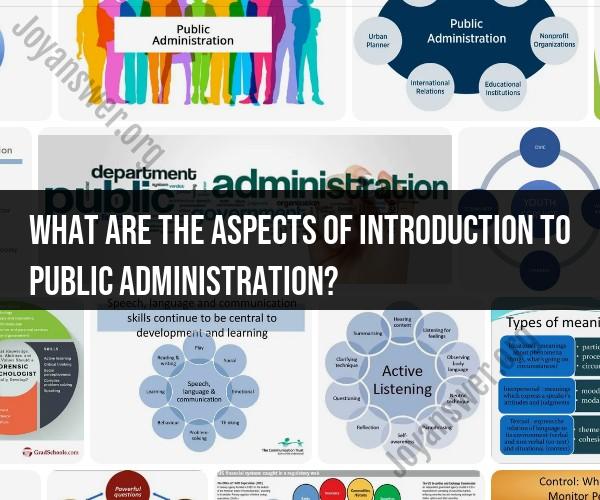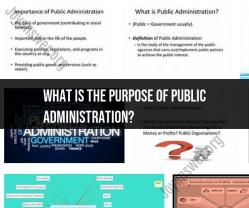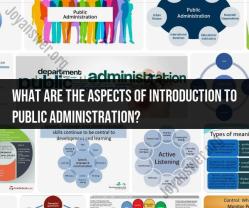What are the aspects of introduction to public administration?
Embarking on an introduction to Public Administration involves understanding key aspects of this field, which plays a critical role in the functioning of government agencies and nonprofit organizations. Here are some essential aspects to explore:
1. Definition of Public Administration:
- Public Administration refers to the organization, management, and implementation of public policies, programs, and services by government entities and non-governmental organizations. It involves the effective and efficient allocation of resources to achieve public goals and serve the needs of communities and citizens.
2. Historical Development:
- Study the historical evolution of Public Administration, including the influence of scholars like Woodrow Wilson, who emphasized the importance of professional administration in government.
3. Role of Public Administrators:
- Public administrators are responsible for planning, organizing, and executing government policies and programs.
- They often work in areas such as public finance, human resources, policy analysis, and program management.
4. Government Structure and Levels:
- Public Administration operates at various levels of government, including federal, state, and local levels.
- Understand the organizational structures and functions of government agencies and departments.
5. Public Policy and Decision-Making:
- Public administrators participate in policy development and decision-making processes, considering factors such as political dynamics, public opinion, and budget constraints.
- Analyze the policy cycle, which includes agenda setting, policy formulation, implementation, and evaluation.
6. Ethics and Values:
- Public administrators are guided by ethical principles and values, including transparency, accountability, fairness, and the public interest.
- Examine ethical dilemmas and challenges faced by public servants.
7. Public Service Delivery:
- Public Administration focuses on delivering essential services to citizens, such as healthcare, education, transportation, and public safety.
- Explore different service delivery models and their impact on communities.
8. Budgeting and Financial Management:
- Understand the budgetary process in government, including revenue collection, allocation of funds, and financial reporting.
- Learn about public finance principles and budgetary constraints.
9. Public Personnel Management:
- Study human resource management in the public sector, including recruitment, training, performance evaluation, and labor relations.
- Explore issues related to diversity, inclusion, and civil service regulations.
10. Public Sector Reform:- Investigate efforts to reform and modernize public administration to enhance efficiency, effectiveness, and responsiveness.- Examine concepts like New Public Management (NPM) and e-Government.
11. Nonprofit and NGO Administration:- Public Administration principles also apply to nonprofit organizations and non-governmental organizations (NGOs) that serve the public interest.- Explore the unique challenges and governance structures of these entities.
12. Public Administration in a Global Context:- Consider the globalization of public administration and its role in addressing global challenges such as climate change, public health, and international development.
13. Career Opportunities:- Identify career paths within Public Administration, including government positions, nonprofit management, and consulting roles.- Understand the qualifications and skills required for different positions.
14. Ongoing Learning and Development:- Public Administration is a dynamic field that requires continuous learning and professional development to stay updated on policy changes, technological advancements, and best practices.
Starting your journey in Public Administration involves delving into these aspects to build a strong foundation in the field. Whether you plan to work in government, nonprofit organizations, or related sectors, a comprehensive understanding of Public Administration is essential for making a meaningful impact on public policy and service delivery.



